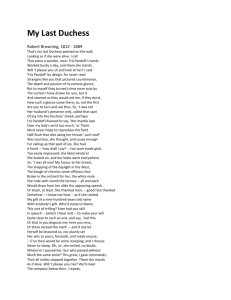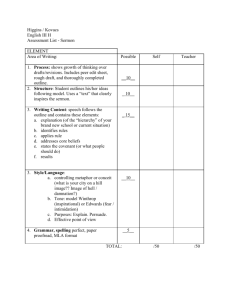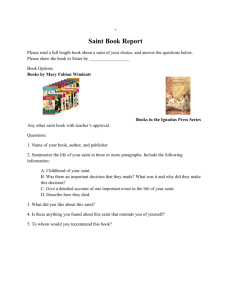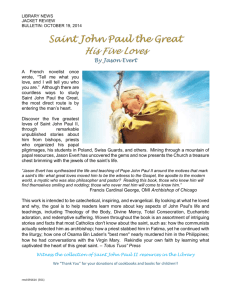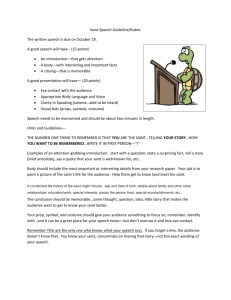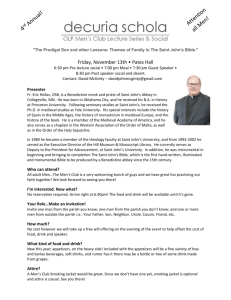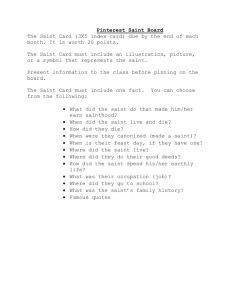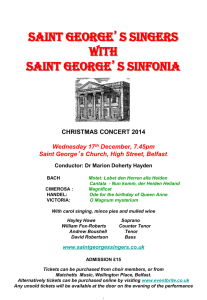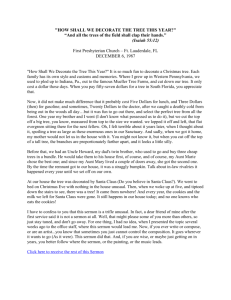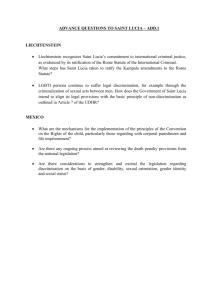ENG2305 – The Victorian Period
advertisement
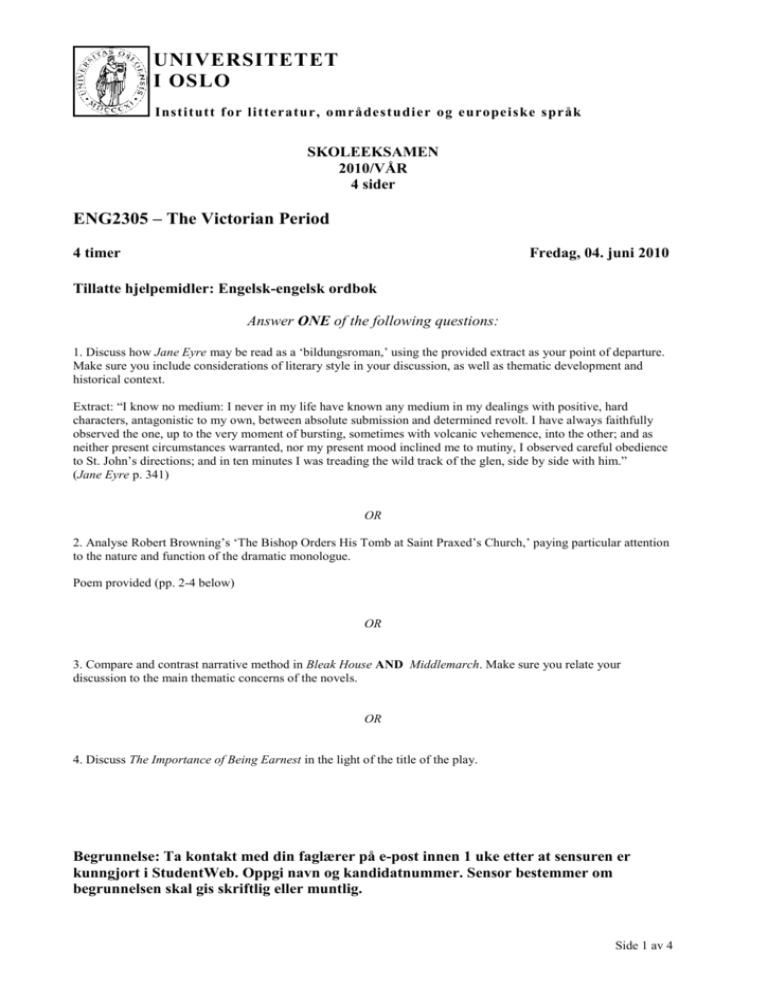
UNIVERSITETET I OSLO Institutt f or litteratur, områdestudier og europeiske språk SKOLEEKSAMEN 2010/VÅR 4 sider ENG2305 – The Victorian Period 4 timer Fredag, 04. juni 2010 Tillatte hjelpemidler: Engelsk-engelsk ordbok Answer ONE of the following questions: 1. Discuss how Jane Eyre may be read as a ‘bildungsroman,’ using the provided extract as your point of departure. Make sure you include considerations of literary style in your discussion, as well as thematic development and historical context. Extract: “I know no medium: I never in my life have known any medium in my dealings with positive, hard characters, antagonistic to my own, between absolute submission and determined revolt. I have always faithfully observed the one, up to the very moment of bursting, sometimes with volcanic vehemence, into the other; and as neither present circumstances warranted, nor my present mood inclined me to mutiny, I observed careful obedience to St. John’s directions; and in ten minutes I was treading the wild track of the glen, side by side with him.” (Jane Eyre p. 341) OR 2. Analyse Robert Browning’s ‘The Bishop Orders His Tomb at Saint Praxed’s Church,’ paying particular attention to the nature and function of the dramatic monologue. Poem provided (pp. 2-4 below) OR 3. Compare and contrast narrative method in Bleak House AND Middlemarch. Make sure you relate your discussion to the main thematic concerns of the novels. OR 4. Discuss The Importance of Being Earnest in the light of the title of the play. Begrunnelse: Ta kontakt med din faglærer på e-post innen 1 uke etter at sensuren er kunngjort i StudentWeb. Oppgi navn og kandidatnummer. Sensor bestemmer om begrunnelsen skal gis skriftlig eller muntlig. Side 1 av 4 Vanity , saith the preacher, vanity!1 Draw round my bed: is Anselm keeping back? Nephews – sons mine2 . . . ah God, I know not! Well – She, men would have to be your mother once, Old Gandolf envied me, so fair she was! What's done is done, and she is dead beside, Dead long ago, and I am Bishop since, And as she died so must we die ourselves, And thence ye may perceive the world's a dream. Life, how and what is it? As here I lie In this state-chamber, dying by degrees, Hours and long hours in the dead night, I ask "Do I live, am I dead?" Peace, peace seems all. Saint Praxed's3 ever was the church for peace; And so, about this tomb of mine. I fought With tooth and nail to save my niche, ye know: – Old Gandolf cozened4 me, despite my care; Shrewd was that snatch from out the corner South He graced his carrion with, God curse the same! Yet still my niche is not so cramped but thence One sees the pulpit o' the epistle-side,5 And somewhat of the choir, those silent seats, And up into the aery dome where live The angels, and a sunbeam's sure to lurk: And I shall fill my slab of basalt6 there, And 'neath my tabernacle7 take my rest, With those nine columns round me, two and two, The odd one at my feet where Anselm stands: Peach-blossom marble all, the rare, the ripe As fresh-poured red wine of a mighty pulse. – Old Gandolf with his paltry onion-stone,8 Put me where I may look at him! True peach, Rosy and flawless: how I earned the prize! Draw close: that conflagration of my church – What then? So much was saved if aught were missed! My sons, ye would not be my death? Go dig The white-grape vineyard where the oil-press stood, Drop water gently till the surface sink, And if ye find . . . Ah God, I know not, I! . . . Bedded in store of rotten fig-leaves soft, And corded up in a tight olive-frail,9 Some lump, ah God, of lapis lazuli,10 Big as a Jew's head cut off at the nape, Blue as a vein o'er the Madonna's11 breast . . . Sons, all have I bequeathed you, villas, all, That brave Frascati12 villa with its bath, So, let the blue lump poise between my knees, Like God the Father's globe on both his hands Vanity…vanity! Cf. Ecclesiastes 1.2, ‘Vanitie of vanities, saith the Preacher, vanitie of vanities, is all vanitie.’ Nephews … mine ‘nephews’ was often adopted euphemistically for ‘sons’ in discussions of the medieval and Renaissance Catholic Priests (whom Church law meant to be celibate and chaste). 3 St Praxed Santa Prassede, virgin and martyr of the second century. 4 cozened tricked 5 epistle-side south side of the church from which the Epistle – one of the letters of the New Testament – is read. 6 basalt greenish or brownish-black rock. 7 tabernacle canopy. 8 onion-stone stone of poor quality. 9 olive-frail basket made of rushes. 10 lapis lazuli semi-precious bright blue stone. 11 Madonna Virgin Mary 12 Frascati town close to Rome dominated by the Villa Aldobrandini. 1 2 Side 2 av 4 Ye worship in the Jesu Church13 so gay, For Gandolf shall not choose but see and burst! Swift as a weaver's shuttle fleet our years:14 Man goeth to the grave, and where is he? 15 Did I say basalt for my slab, sons? Black – 'T was ever antique-black I meant! How else Shall ye contrast my frieze to come beneath? The bas-relief16 in bronze ye promised me, Those Pans and Nymphs17 ye wot18 of, and perchance Some tripod,19 thyrsus,20 with a vase or so, The Saviour at his sermon on the mount, 21 Saint Praxed in a glory, and one Pan Ready to twitch the Nymph's22 last garment off, And Moses with the tables23 . . . but I know Ye mark me not! What do they whisper thee, Child of my bowels,24 Anselm? Ah, ye hope To revel down my villas while I gasp Bricked o'er with beggar's mouldy travertine 25 Which Gandolf from his tomb-top chuckles at! Nay, boys, ye love me – all of jasper,26 then! 'T is jasper ye stand pledged to, lest I grieve. My bath must needs be left behind, alas! One block, pure green as a pistachio-nut, There's plenty jasper somewhere in the world – And have I not Saint Praxed's ear to pray Horses for ye, and brown Greek manuscripts, And mistresses with great smooth marbly limbs? – That's if ye carve my epitaph aright, Choice Latin, picked phrase, Tully's27 every word, No gaudy ware like Gandolf's second line – Tully, my masters? Ulpian28 serves his need And then how I shall lie through centuries, And hear the blessed mutter of the mass, And see God made and eaten all day long, And feel the steady candle-flame, and taste Good strong thick stupefying incense-smoke! For as I lie here, hours of the dead night, Dying in state and by such slow degrees, I fold my arms as if they clasped a crook,29 And stretch my feet forth straight as stone can point, Jesu Church Rome’s Chiesa del Gesù Swift…years cf. Job 7.6, ‘My dayes are swifter then a weavers shuttle, and are spent without hope’. 15 Man…he cf. Job 7.9, ‘As the cloud is consumed and vanisheth away: so he that goeth downe to the grave, shall come up no more’, and Job 14.10, ‘But man dyeth, and wasteth away; yea, man giveth up the ghost, and where is hee?’ 16 bas-relief sculpture or carving where the figures project less than one half of their true proportions. 17 Pans and Nymphs figures from classical mythology. Their conjunction with Christian iconography was a familiar trait of Renaissance tomb work. Pan, Greek god of the field and forest, was associated with licentiousness. 18 wot know. 19 tripod three-legged vessel used for votive offering in Classical religious rites. 20 thyrsus staff or spear tipped with an ornament like a pine-cone borne by Dionysus – god of wine and orgies – and his followers. 21 sermon on the mount for Jesus’s Sermon on the Mount, see Matthew 5-7. 22 Nymph minor deity in Classical mythology. 23 tables stones on which the Ten Commandments were engraved (see Exodus 20). 24 bowels seat of emotions, ‘heart’. 25 travertine white limestone 26 jasper precious stone, usually red. 27 Tully Marcus Tullius Cicero (106-43 BC), masterly Roman orator and statesman, who set the standard for formal Latin eloquence. 28 Ulpian Domitius Ulpianus, fl. 212-23 AD, a jurist: here, a lesser writer than Cicero (Tully). 29 crook pastoral staff of a bishop. 13 14 Side 3 av 4 And let the bedclothes, for a mortcloth, 30 drop Into great laps and folds of sculptor's-work: And as yon tapers dwindle, and strange thoughts Grow, with a certain humming in my ears, About the life before I lived this life, And this life too, popes, cardinals and priests, Saint Praxed at his sermon on the mount,31 Your tall pale mother with her talking eyes, And new-found agate32 urns as fresh as day, And marble's language, Latin pure, discreet, – Aha, elucescebat33 quoth our friend? No Tully, said I, Ulpian at the best! Evil and brief hath been my pilgrimage. 34 All lapis , all, sons! Else I give the Pope My villas! Will ye ever eat my heart? Ever your eyes were as a lizard's quick, They glitter like your mother's for my soul, Or ye would heighten my impoverished frieze,35 Piece out its starved design, and fill my vase With grapes, and add a vizor36 and a Term,37 And to the tripod ye would tie a lynx38 That in his struggle throws the thyrsus down, To comfort me on my entablature39 Whereon I am to lie till I must ask "Do I live, am I dead?" There, leave me, there! For ye have stabbed me with ingratitude To death – ye wish it – God, ye wish it! Stone – Gritstone,40 a-crumble! Clammy squares which sweat As if the corpse they keep were oozing through – And no more lapis to delight the world! Well go! I bless ye. Fewer tapers there, But in a row: and, going, turn your backs – Ay, like departing altar-ministrants, And leave me in my church, the church for peace, That I may watch at leisure if he leers – Old Gandolf, at me, from his onion-stone, As still he envied me, so fair she was! 30 mortcloth funeral pall. Saint…mount the bishop’s mind is going: St Praxed was female, and Jesus delivered the Sermon on the Mount (see note 21). 32 agate multi-coloured precious stone. 33 elucescebat ‘He was illustrious’ (Ciceronian Latin = elucebat). 34 Evil…pilgrimage cf. Genesis 47.9, ‘And Iacob said unto Pharaoh, The dayes of the yeeres of my pilgrimage are an hundred & thirtie yeres: few and evill have the dayes of the yeeres of my life bene, and have not unto the dayes of the yeeres of the life of my fathers, in the dayes of their pilgrimage’. 35 frieze band of painted or sculptured decoration. 36 vizor mask. 37 Term statue representing the upper part of the body, sometimes without the arms, and terminating below in a pedestal. 38 lynx lynxes, panthers and other wild cats often accompany representations of Dionysius. 39 entablature the Bishop means, loosely, that which is above the frieze, but the word is not accurately used. 40 Gritstone cheap sandy stone. 31 Side 4 av 4
